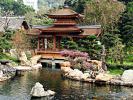Shénnóng and the Agriculturalist School
In Chinese philosophical history, celebration of simple styles of life close to nature is typically attributed to the Daoists. Within the Dàodéjīng, sophistication is a main cause of a violent world that has ‘lost the Way’. Rituals and cleverness feed a superficiality and hypocrisy that was absent in the simpler societies that existed long ago in the past. Zhuāngzǐ, too, constantly calls our admiring attention to the unconstrained spontaneity natural to the creatures most of us we treat so dreadfully. Daoist texts also see nature as a model for authentic human conduct – rivers that symbolise constancy, say, and the night skies that intimate the mysterious Dào (‘Way’) holding sway over the world. The artificiality celebrated by the Confucians and other schools is contrasted with simple ways of life lived closer to nature praised by Daoists.

This tidy picture of Daoist praise of spontaneity and simplicity versus the overactive, corrupting artificiality of Confucianism is clearly too simplistic. There is clear variation within and between those rich philosophies. The Dàodéjīng is sympathetic to statecraft in a way that Zhuāngzǐ is clearly not. Confucius sees ‘rituals’ as vital to authentic moral practice but hated superficiality and hypocrisy. Daoists and Confucians would concur in the critique of the bureaucratism and harsh moral ethos of the Legalists. Moreover, we should always take care to avoid attractive but simplistic dualisms – nature/culture being a case in point.
A more interesting reason to demur before crediting Daoism as the Chinese philosophy focused on simpler, more natural life-styles is the availability of alternative candidates. Perhaps the best is the Nóngjiā, an agrarian philosophy inspired by the thought and example of the legendary sage-king, Shénnóng.
The ‘divine farmer’
According to Chinese tradition, the earliest humans had a dreadful life.
They were constantly vulnerable to wild animals, storms, and starvation and struggled to subsist – a precarious ‘state of nature’. Consistent with similar myths in other cultures, they were saved from this dire state by sages who introduced innovations like writing, technology, and organised forms of culture. Institutions arose which gradually transformed human life. Chinese tradition includes Three Sovereigns and Five Emperors – one of whom, Shénnóng, the ‘Divine Farmer’, taught people the arts of agriculture, such as crop planting and the domestication of animals.
Shénnóng is credited as a sage, a person of profound wisdom who helped transform human life and practice. According to legend, Shénnóng was not a unifier of the sort admired by Kǒngzı or the bureaucratic overseer the Legalists thought could enforce social order.

Shénnóng ruled a decentralised empire of tiny fiefs – small, local communities bound together by a trust rooted in mutual acquaintance and shared work. There were no ministers or laws and – if the legends are believed – it was a time of peace and prosperity. Uncontaminated by desires for elaborate goods and free from the cynicism born of lack of trust in distant leaders, people lived simpler, happier lives. It is a world of natural and moral order where the people spontaneously act rightly and all things flourish:
What grows up through spring and autumn is not to be injured or obstructed; carefully tend what is beneficial in the land, so that the myriad things complete their growth; do not snatch away what benefits the people, and the farmers will work in accord with the seasons (Huáinánzi, Ch.6)
According to Shénnóng, rulers had a limited number of very simple functions, mainly concerning agriculture. A ruler should teach people agricultural arts, inspect their fields, and keep a grain store (dispensing it in bad years, storing it during good years). Here we see the germ of themes taken up by other schools: the Dàodéjīng vision of sage-rulers who work with natural processes and ‘fill the bellies’ of the people, say, and the Mohist and Legalist emphases on the importance of state overseeing of agriculture. If teaching agriculture and stocking granaries seems dull, we ought to recall how devastating famine could be – tens of thousands could die.
The simplicity of this conception of the ruler is still rooted in a philosophical vision of a flourishing human life. A school emerged devoted to developing the ideals expressed in the legend of Shénnóng – the Nóngjiā, the School of Agrarianism or, more poetically, ‘the School of Tillers’.

Ian James Kidd: Going Slow
A rhetoric of slowness and speed has been used by philosophers since the ancient periods to characterise and assess different ways of life. Buddhist, Confucian, and Daoist discourses exploit associations, literal and figurative, between slower styles of life and virtue, on the one hand, and hastier styles of life and vice, on the other.
The School of the Tillers
The Nóngjiā were one of the reputed Hundred Schools of Thought which flourished within China from the 6th century to 221 BCE. Many of these were named for the occupations – tillers, diplomats, militarists – central to their concerns. Here we should recall Kǒngzı’s critical remarks on ‘vessels’ – people specialised in a specific craft or trade – and his related conviction that a morally excellent person is no limited ‘vessel’. The art of living requires expansive generalism, not narrow specialism.
A distinguished scholar, A.C Graham, describes the Nóngjiā as unique, ‘the one school which reflects the aspirations of the peasants’. These included being able to live and work in peace, unhurried and able to labour according to their own ways, without intrusive control by distant rulers. Left to till the earth in peace, people naturally tend towards ways of life characterised by an unforced trust in others and an appreciative care for the natural world. For this reason, Shénnóng’s legend and example are ‘ancestral to all Chinese utopianism’.

A book, Shénnóng, is now lost, although some of its contents were described, however accurately, in a later syncretic text, the Huáinánzi (c. 139 BCE). It reports the book had chapters on law, teaching, numbers, and ‘prohibition’ – the latter urging humans not to obstruct the natural processes which ensure balance and growth in the world. This has two aspects. On the negative side we should resist and condemn the drives to complexity – manifested in ambitions to impose ‘order’ onto things which feeds aggressive, myopic stances on the world. On the positive side, we should teach people to realise simplicity in their desires, goals, habits, and ways of life. Farming offers clear images: a good farmer understands the natures and needs of animals, accords with natural rhythms of the seasons, and appreciates what the land is able to sustainably yield.
The Nóngjiā agrarian vision of small self-sustaining and peaceable communities of proto-environmentalists might be attractive. It inspired the agrarian movements of Europe and North America and resonates with many themes in anarchist and environmentalist thought – like a focus on sustainability, localism, and a minimal state. But attractiveness and practicability are quite different things. A.C. Graham speaks for many commentators in judging Shénnóng political theory as a ‘combination of the practical and the naïve’. Certainly, it is very easy to romanticise an agrarian life of toil in the fields and few of those who admire those ideals actually pursue them. Elsewhere, though, Graham is more sympathetic. What we see in the ‘Way of Shen-nong’ is a political and moral ideal clearly distinguishable from Confucianism, Mohism, Legalism, and Daoism. Of course, this is not very sympathetic: coherence is a low bar to meet. There are other qualities to consider, too. Is the Way of Shen-nong also compelling, practicable, and so on?
Graham nicely describes the general character of the Shénnóng vision of life:
The Shen-nong ideal is of a world of village communities where a man’s word can be trusted by his neighbours without the need for oaths and covenants, where only idle hands make mischief and disputes are better settled by local custom than by calling in the law, under leaders who work their own land and are obeyed because everyone can see the point of their decisions (Disputers of the Tao, 69-70)
What might be more philosophically relevant are not the arguments or doctrines of the Nóngjiā. It is the moods and feelings that it expresses — nostalgia for a simpler life, the appreciation of moral innocence that is no sooner realised than lost and that nourishing feeling of ‘at-home-ness’ that Roger Scruton called oikophilia. Nostalgia and a sense of lost innocence and a sense of belonging to a place one has caringly cultivated – all these reflect sentiments and needs that go deep with human beings.

Rice Culture, or Sowing and Reaping. Handscroll by unidentified artist. Public domain.
Innocence
A simple agrarian life devoted to hard work, modesty and perseverance and the absence of complicating artifice may be attractive. It might also be unsustainable given the way that the world has come to be – the metaphor of innocence is appropriate since it refers to something which once lost cannot be regained. Our innocence cannot be consciously appreciated. It can only be lamented once it is lost, prized in those who still possess it, then meditated on as an ideal.

In Chinese history, the sort of simple agrarianism which the Nóngjiā esteemed was doomed to be displaced by the social and technological developments they made possible (including major agricultural advances during the Spring and Autumn period, 722-481 BC). Soon, older social and economic arrangements were replaced by larger and more complex enterprises. One consequence was a reliance on ever-more complex ‘covenants’ – formalised agreements which replaced informal relations of trustful acquaintance.
Another was a hugely expanded role, in human life, for self-conscious calculations of profits which added potent incentives to exploitativeness. We see a clear legacy of all this in Daoism. Zhuāngzǐ and the anonymous authors of the Dàodéjīng were acute critics of the perverse drive in human beings towards complexification. We can read the Dàodéjīng as a lamentation of our ceaseless march toward ever-more expansive systems of artifice. Our natural sense of spontaneity is eroded and our capacity to experience the ‘ten thousand things’ in all their richness and integrity – a catastrophic narrowing of our ‘heart-minds’ that dooms us to ever-more violent and unstable ways of living. Animals become ‘meat-on-legs’. Forests become timber and rivers become water-power suppliers. Farming becomes a mass conversion of beings into matter. Modern-day industrial agriculture – with its CAFOs and other horrors – are what eventually results from the relentless indulgence of those drives.
One can consistently condemn these developments and experience a genuine longing for the simpler ways of life which preceded them, even if they also regard those ways are nowadays untenable. A small number will retain older, simpler ways of life, but most won’t. Internalisation of the expectations of an artificial society comes to define our sense of how a life should be – convenience, easiness, and availability and obliviousness (a neighbour recently asked me what ‘seasonal produce’ meant). ‘Growing one’s own’ for most of us may be nice – tomatoes from the allotment, chillies from the window-box. But this isn’t a realistic alternative to the resource-intensive food systems integral to the infrastructure of the Global North.

Ian James Kidd: Gardens of Refuge
From the Garden of Eden to urban allotments, gardens have accompanied and enriched human history and culture from ancient times to now. In this article, Ian James Kidd traces the spiritual history of gardens as places of refuge from the world.
Appreciation of the simplicity of the Nóngjiā ideal will modulate into a poignant realisation that we cannot return to that way of life, either practically or morally. We cannot regain our more innocent ways of experiencing ourselves and the world and its creatures. We are now too cultured, too complex, too irreversibly sophisticated. Perhaps this is why scholars like Graham describe the Shénnóng agrarian utopianism as describing a ‘stage’ in a process of cultural development: a formative stage through which we pass on our inexorable way to ever-more complex forms of life.

A key question is what lessons for the conduct of life a person ought to draw from these historical narratives. In academic literature on agrarianism, two central themes are ‘nostalgia’ and ‘innocence’. I think these point to one deep moral conclusion to draw from the legend of Shénnóng.
Toil
We know very little about the Nóngjiā. A few of their texts survived the 213 BCE Burning of the Books, mainly their farming manuals. Otherwise, they are known to us only by their influence on other more-enduring schools.
Certainly, pastoralist utopianism itself had a long afterlife in Chinese history. In many cases, celebration of the virtuousness of the peasantry was a strategy for condemnation of cultured elites. Mao’s Cultural Revolution (1966-77) was a time of massacres, destruction of artefacts, ransacking of cultural sites, and the purging of ‘dissidents’. One specific aim was an assault on education: millions of scholars were forcibly relocated to the countryside to work the land. The ideal of rural utopia became the reality of violent dystopia (though we should beware claims that agrarianism was responsible for so-called ‘oriental despotism’).

Photo by Natalia Chernenko on Unsplash
An enduring philosophical lesson of the Nóngjiā might be a deep ambivalence about our history and current state. The celebration of an earlier stage of moral innocence can induce feelings of nostalgia and longing that can feed deep disenchantment with the world as it has come to be. But a wiser approach is to affirm the moral realities of the world and find ways to accommodate to them. Perhaps Nóngjiā philosophers would have urged us to seek whatever forms of trustful relationships might still be available to us. They may also urge us to attend more closely to whatever of our customs remain, rather than insouciantly dismiss them. An acute sense of nostalgia for what is lost need not lapse into agrarian fantasism. Nor need recognition of the virtues of the farmers of Shénnóng’s world obscure the painful slog of a life working the land. Indeed, what occurs over time is an increase in the moral toil integral to human life.

Zhuāngzǐ at one point reflects on Shénnóng’s world:
In Shennong’s time people laid down tired and got up wide-awake. They knew their mothers but not their fathers and lived together with the deer. They farmed their own food and wove their own clothes and had no idea of hurting each other. This was the high point of power (The Book of Zhuāngzǐ, ch. 29)
Life subsequently got harder. Exhaustion, uncertainty and increasing interdependence created novel temptations and risks. Our simplicity and innocence gave way to conscious sophistication – a natural process of growth that a society of farmers would appreciate. One scholar remarks that this account of the moral history of humankind is misanthropic and suggests the Nóngjiā point is provocative: we should locate optimal virtue in ‘pre-human experience’ and appreciate that ‘becoming human signals a decline’.
What Shénnóng helped to initiate was a long process of cultural development which constantly generates new possibilities for collective moral failure. The sensible approach is to try to attain a clearsighted vision of our moral condition, one that avoids romanticisation of what we were, denialism about what we have become, and utopianism about what we may become into the future.
◊ ◊ ◊






